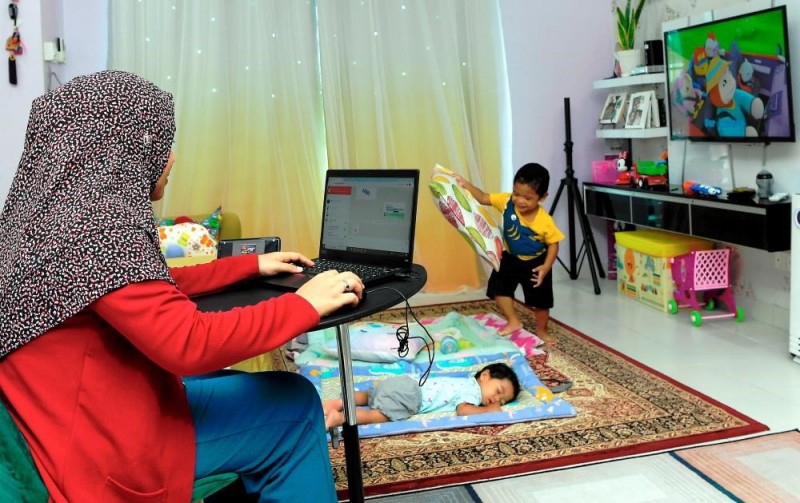
KUALA LUMPUR: The aftermath of the Covid-19 pandemic has popularised the term “work from home (WFH)”. Employees claim better work-life balance as they save valuable time in travelling to the office and back. Employers claim great savings from rent, utilities and pantry bills, among others.
But a globally recognised outsourcing expert has warned that danger lurks while working from home, and it could potentially cost billions of ringgit annually in terms of business risks and data breaches.
Bobby Varanasi is chairman and CEO of Matryzel Consulting Inc and is recognised by US-based Thinkers360 – the world’s largest marketplace for B2B thought leaders and influencers – as among the top 20 global thought leaders in Future of Work and Business Strategy.
His company has also been recognised by the US-based International Association of Outsourcing Professionals as Best of Best Outsourcing Advisory Firms from 2013 to 2015, and 2019.
Speaking exclusively to theSun, Varanasi said not many realise the business risks to employers caused by WFH and the dangers posed by it.
“These range from increased cybersecurity risks and loss of data integrity, to cost of provisioning new technical solutions, a possible lack of loyalty and employee retention, and even moonlighting. All these can potentially cost employers billions of ringgit annually.
“Consider also that an employee’s home is his ‘private space’. Hence, such locations cannot be secured physically or virtually with respect to access controls for unauthorised personnel and technical or physical infrastructure such as notebooks, pen drives, cameras and mobile phones.
“The danger is that companies have no line of sight as to who else has access to such data and applications within a household. Some remote monitoring tools have been developed, for example, the ‘remote desktop switch-off’ activates when the computer’s videocam discovers unauthorised persons looking into the console.
“But none of these tools or technologies are sufficient to manage and ensure
Varanasi said regardless of how much individuals may like using their wireless broadband connections on their mobile devices, corporate networks that are private in nature have stricter end-to-end encryption, thereby enabling the establishment of a highly controlled environment.
“When remote work is introduced via homes, such networks are accessed by the employee through a public network first, before corporate protocols around the control of access are satisfied.
“Home connections introduce companies to significant vulnerabilities. Usage of Virtual Private Networks may assist, but such hop-step-jump connections create operational delays, particularly for services that are in real-time, like trade and financial transactions, customer support voice operations and cloud-based solutions.
“This is where data breaches happen. Just think of the hackers and scammers that are currently running wild in Malaysia, so much so that even bank security systems are no match for them. So, what chance do private home networks stand?”
For employers, Varanasi said having a remote workforce means companies must deploy technology assets such as computers, keyboards, headsets and a Yubikey or ubiquitous key, which is a security token that enables users to add a second authentication factor to online services in employee homes. But employers are forced to continue managing such assets.
“Suddenly, WFH caused technical support to become more expensive. The savings employers expected from WFH models translated into higher operations costs, and the consequential loss of productivity rose by up to 20%.
“Earlier claims that WFH would boost productivity by about 47% owing to reduced commuting time, working an extra day in a week from home, or reducing time wastage each day compared with working in an office environment has been completely debunked,” he said.
Varanasi said such claims only take the time-cost of productivity into account. However, softer aspects like the cost of collaboration, ideation, cultural influences on performance and teamwork are not collectively accounted for.
“The 2001 statement by the Human-Computer Interaction Institute at Carnegie Mellon University, which said, ‘collaboration at a distance remains substantially harder to accomplish than collaboration when members of a work group are collocated’ remains true even today.”
Varanasi said this brings into question a WFH employee’s loyalty to serve just one employer. Employees have been caught working multiple jobs for multiple companies, which may enhance their financial positions, but at a significant cost to the employer.
“Employees are bound by contractual obligations with employers. Among others, this includes strict policies, protocols and procedures around data and client confidentiality, skills usage and deployment only for the employer, leverage of corporate intellectual property, data integrity and more.”
In cases where moonlighting is rampant, Varanasi said companies are at a loss in terms of ensuring data integrity, breaches of Internet Protocols, revenue losses and lack of employee commitment. He said these issues add significant costs to ongoing business operations and the larger competitiveness of the employer.
“In a virtual-real world where businesses, services and people are converging, WFH will remain a solution for some employers and employees. However, one must consider if the risks outweigh the benefits.”
Source: https://www.thesundaily.my/local/wfh-practice-may-expose-employers-to-risks-expert-LM10850874

